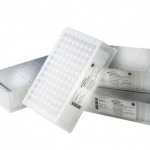
When establishing purification processes for a biosimilar molecule it is important to develop steps that are scalable, selective, and cost-effective.
A cation exchange (CIEX) chromatographic step was developed as part of a collaborative project, where expertise in the field of downstream purification and bioprocessing was combined with specific biosimilar requirements. A standardized workflow was adapted using a high throughput process development (HTPD) approach: chromatography resin and running conditions were selected based on experience and adapted to meet requirements. By providing the process development support, aggressive timelines could be addressed, which resulted in an accelerated progression of bioprocess design to reduce timelines.
The aim was to select the optimal resin from three candidates and provide initial running conditions for the chosen resin. The goal was to reduce aggregate levels to approximately 0.6% after the polishing step in conjunction with obtaining the highest yield possible for the monomer. HTPD experiments were performed in both in 96-well plates and small-scale columns.